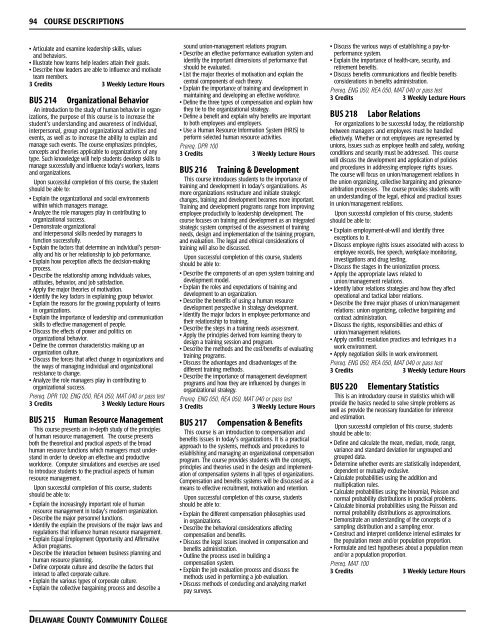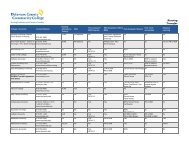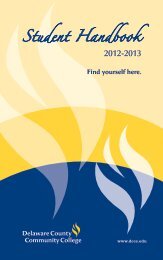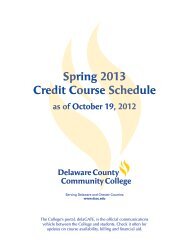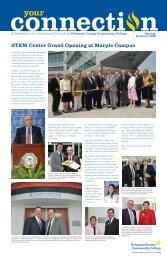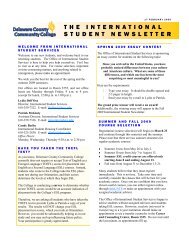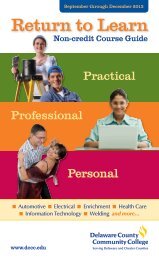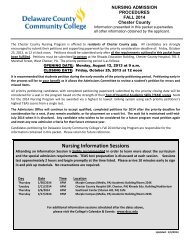2010 Catalog - Delaware County Community College
2010 Catalog - Delaware County Community College
2010 Catalog - Delaware County Community College
You also want an ePaper? Increase the reach of your titles
YUMPU automatically turns print PDFs into web optimized ePapers that Google loves.
94 COURSE DESCRIPTIONS<br />
• Articulate and examine leadership skills, values<br />
and behaviors.<br />
• Illustrate how teams help leaders attain their goals.<br />
• Describe how leaders are able to influence and motivate<br />
team members.<br />
3 Credits 3 Weekly Lecture Hours<br />
BUS 214<br />
Organizational Behavior<br />
An introduction to the study of human behavior in organizations,<br />
the purpose of this course is to increase the<br />
student's understanding and awareness of individual,<br />
interpersonal, group and organizational activities and<br />
events, as well as to increase the ability to explain and<br />
manage such events. The course emphasizes principles,<br />
concepts and theories applicable to organizations of any<br />
type. Such knowledge will help students develop skills to<br />
manage successfully and influence today's workers, teams<br />
and organizations.<br />
Upon successful completion of this course, the student<br />
should be able to:<br />
• Explain the organizational and social environments<br />
within which managers manage.<br />
• Analyze the role managers play in contributing to<br />
organizational success.<br />
• Demonstrate organizational<br />
and interpersonal skills needed by managers to<br />
function successfully.<br />
• Explain the factors that determine an individual's personality<br />
and his or her relationship to job performance.<br />
• Explain how perception affects the decision-making<br />
process.<br />
• Describe the relationship among individuals values,<br />
attitudes, behavior, and job satisfaction.<br />
• Apply the major theories of motivation.<br />
• Identify the key factors in explaining group behavior.<br />
• Explain the reasons for the growing popularity of teams<br />
in organizations.<br />
• Explain the importance of leadership and communication<br />
skills to effective management of people.<br />
• Discuss the effects of power and politics on<br />
organizational behavior.<br />
• Define the common characteristics making up an<br />
organization culture.<br />
• Discuss the forces that affect change in organizations and<br />
the ways of managing individual and organizational<br />
resistance to change.<br />
• Analyze the role managers play in contributing to<br />
organizational success.<br />
Prereq. DPR 100, ENG 050, REA 050, MAT 040 or pass test<br />
3 Credits 3 Weekly Lecture Hours<br />
BUS 215<br />
Human Resource Management<br />
This course presents an in-depth study of the principles<br />
of human resource management. The course presents<br />
both the theoretical and practical aspects of the broad<br />
human resource functions which managers must understand<br />
in order to develop an effective and productive<br />
workforce. Computer simulations and exercises are used<br />
to introduce students to the practical aspects of human<br />
resource management.<br />
Upon successful completion of this course, students<br />
should be able to:<br />
• Explain the increasingly important role of human<br />
resource management in today's modern organization.<br />
• Describe the major personnel functions.<br />
• Identify the explain the provisions of the major laws and<br />
regulations that influence human resource management.<br />
• Explain Equal Employment Opportunity and Affirmative<br />
Action programs.<br />
• Describe the interaction between business planning and<br />
human resource planning.<br />
• Define corporate culture and describe the factors that<br />
interact to affect corporate culture.<br />
• Explain the various types of corporate culture.<br />
• Explain the collective bargaining process and describe a<br />
sound union-management relations program.<br />
• Describe an effective performance evaluation system and<br />
identify the important dimensions of performance that<br />
should be evaluated.<br />
• List the major theories of motivation and explain the<br />
central components of each theory.<br />
• Explain the importance of training and development in<br />
maintaining and developing an effective workforce.<br />
• Define the three types of compensation and explain how<br />
they tie to the organizational strategy.<br />
• Define a benefit and explain why benefits are important<br />
to both employees and employers.<br />
• Use a Human Resource Information System (HRIS) to<br />
perform selected human resource activities.<br />
Prereq. DPR 100<br />
3 Credits 3 Weekly Lecture Hours<br />
BUS 216<br />
Training & Development<br />
This course introduces students to the importance of<br />
training and development in today's organizations. As<br />
more organizations restructure and initiate strategic<br />
changes, training and development becomes more important.<br />
Training and development programs range from improving<br />
employee productivity to leadership development. The<br />
course focuses on training and development as an integrated<br />
strategic system comprised of the assessment of training<br />
needs, design and implementation of the training program,<br />
and evaluation. The legal and ethical considerations of<br />
training will also be discussed.<br />
Upon successful completion of this course, students<br />
should be able to:<br />
• Describe the components of an open system training and<br />
development model.<br />
• Explain the roles and expectations of training and<br />
development to an organization.<br />
• Describe the benefits of using a human resource<br />
development perspective in strategy development.<br />
• Identify the major factors in employee performance and<br />
their relationship to training.<br />
• Describe the steps in a training needs assessment.<br />
• Apply the principles derived from learning theory to<br />
design a training session and program.<br />
• Describe the methods and the cost/benefits of evaluating<br />
training programs.<br />
• Discuss the advantages and disadvantages of the<br />
different training methods.<br />
• Describe the importance of management development<br />
programs and how they are influenced by changes in<br />
organizational strategy.<br />
Prereq. ENG 050, REA 050, MAT 040 or pass test<br />
3 Credits 3 Weekly Lecture Hours<br />
BUS 217<br />
Compensation & Benefits<br />
This course is an introduction to compensation and<br />
benefits issues in today's organizations. It is a practical<br />
approach to the systems, methods and procedures to<br />
establishing and managing an organizational compensation<br />
program. The course provides students with the concepts,<br />
principles and theories used in the design and implementation<br />
of compensation systems in all types of organizations.<br />
Compensation and benefits systems will be discussed as a<br />
means to effective recruitment, motivation and retention.<br />
Upon successful completion of this course, students<br />
should be able to:<br />
• Explain the different compensation philosophies used<br />
in organizations.<br />
• Describe the behavioral considerations affecting<br />
compensation and benefits.<br />
• Discuss the legal issues involved in compensation and<br />
benefits administration.<br />
• Outline the process used in building a<br />
compensation system.<br />
• Explain the job evaluation process and discuss the<br />
methods used in performing a job evaluation.<br />
• Discuss methods of conducting and analyzing market<br />
pay surveys.<br />
• Discuss the various ways of establishing a pay-forperformance<br />
system.<br />
• Explain the importance of health-care, security, and<br />
retirement benefits.<br />
• Discuss benefits communications and flexible benefits<br />
considerations in benefits administration.<br />
Prereq. ENG 050, REA 050, MAT 040 or pass test<br />
3 Credits 3 Weekly Lecture Hours<br />
BUS 218<br />
Labor Relations<br />
For organizations to be successful today, the relationship<br />
between managers and employees must be handled<br />
effectively. Whether or not employees are represented by<br />
unions, issues such as employee health and safety, working<br />
conditions and security must be addressed. This course<br />
will discuss the development and application of policies<br />
and procedures in addressing employee rights issues.<br />
The course will focus on union/management relations in<br />
the union organizing, collective bargaining and grievancearbitration<br />
processes. The course provides students with<br />
an understanding of the legal, ethical and practical issues<br />
in union/management relations.<br />
Upon successful completion of this course, students<br />
should be able to:<br />
• Explain employment-at-will and identify three<br />
exceptions to it.<br />
• Discuss employee rights issues associated with access to<br />
employee records, free speech, workplace monitoring,<br />
investigations and drug testing.<br />
• Discuss the stages in the unionization process.<br />
• Apply the appropriate laws related to<br />
union/management relations.<br />
• Identify labor relations strategies and how they affect<br />
operational and tactical labor relations.<br />
• Describe the three major phases of union/management<br />
relations: union organizing, collective bargaining and<br />
contract administration.<br />
• Discuss the rights, responsibilities and ethics of<br />
union/management relations.<br />
• Apply conflict resolution practices and techniques in a<br />
work environment.<br />
• Apply negotiation skills in work environment.<br />
Prereq. ENG 050, REA 050, MAT 040 or pass test<br />
3 Credits 3 Weekly Lecture Hours<br />
BUS 220<br />
Elementary Statistics<br />
This is an introductory course in statistics which will<br />
provide the basics needed to solve simple problems as<br />
well as provide the necessary foundation for inference<br />
and estimation.<br />
Upon successful completion of this course, students<br />
should be able to:<br />
• Define and calculate the mean, median, mode, range,<br />
variance and standard deviation for ungrouped and<br />
grouped data.<br />
• Determine whether events are statistically independent,<br />
dependent or mutually exclusive.<br />
• Calculate probabilities using the addition and<br />
multiplication rules.<br />
• Calculate probabilities using the binomial, Poisson and<br />
normal probability distributions in practical problems.<br />
• Calculate binomial probabilities using the Poisson and<br />
normal probability distributions as approximations.<br />
• Demonstrate an understanding of the concepts of a<br />
sampling distribution and a sampling error.<br />
• Construct and interpret confidence interval estimates for<br />
the population mean and/or population proportion.<br />
• Formulate and test hypotheses about a population mean<br />
and/or a population proportion.<br />
Prereq. MAT 100<br />
3 Credits 3 Weekly Lecture Hours<br />
DELAWARE COUNTY COMMUNITY COLLEGE


